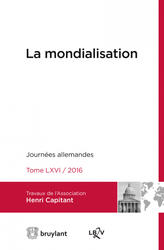Aug. 18, 2020
Newsletter MAFR - Law, Compliance, Regulation

Full reference: Frison-Roche, M.-A., Can Coordination between local Regulators replace a unique centralized Regulator? Example of the European organisation of the Open Internet Principle, Newsletter MAFR - Law, Compliance, Regulation, 18th of August 2020
Read, by freely subscribing, the other news of the Newsletter MAFR - Law, Compliance, Regulation
To go further, read Marie-Anne Frison-Roche's article: The hypothesis of interregulation
Summary of the news
The principle of "open internet" enshrined in the European regulation of 30th of April 2016 guaranteeing a non discriminatory access to Internet contents and services. However, there is no European regulator to implement such a principle. Is it possible to guarantee the effectivity of this principle without a central regulator in charge of this principle?
On 11st of June 2020, the BEREC (Body of European Regulators for Electronic Communications) adopted guidelines concerning the application of the open internet principle. The BEREC is not a European regulator but a network of national regulators aiming to coordinate their actions. This body is only a consultative body but its recommendations are taken into account by national authorities which have deep legal power, as Osborne-Clarke said about the technical implementation of the European principle of open internet at the national level.
It is thus non necessary to have a central regulator to ensure the effectivity of a principle since the moment when there is a local regulators network able to coordinate their actions through soft law.
Oct. 25, 2017
Publications

🌐follow Marie-Anne Frison-Roche on LinkedIn
🌐subscribe to the Newsletter MAFR Regulation, Compliance, Law
____
► Full Reference: M.-A. Frison-Roche, "La mondialisation du point de vue du Droit" (Globalisation from a legal perspective), in Association Henri Capitant, La mondialisation, t. LXVI/2016, Berlin, Bruylant, coll. "Travaux de l'Association Henri Capitant", 2017, pp. 11-30
____
📝read the article (in French)
____
____
🚧lire le document de travail bilingue sur la base duquel cet article a été élaboré, doté de développements supplémentaires, de références techniques et de liens hypertextes
____
► English summary of this article: Globalisation is a confusing phenomenon for lawyers. The first thing to do is to take the measure of it.
Once this has been done, it is essential to allow oneself to think something about it, or even to force oneself to think something about it. For example, on the novelty or otherwise of the phenomenon, which then enables us to assess what is being put in place.
If Law can and must "pretend" to defend every human being, a universal ambition that is intended to confront the global field of forces, then the next - but secondary - question is: quid facere?
Nothing? Less than nothing? Or regulate? Or do we still affirm that the Law fulfills its primary function, which is to protect the weak, even in the power struggle that is Globalisation?
____
📝read the summary and conclusive report of the symposium organised by the Association Henri Capitant, as part of the Journées internationales Allemande about La Mondialisation in Berlin, the 27 May 2016.
________